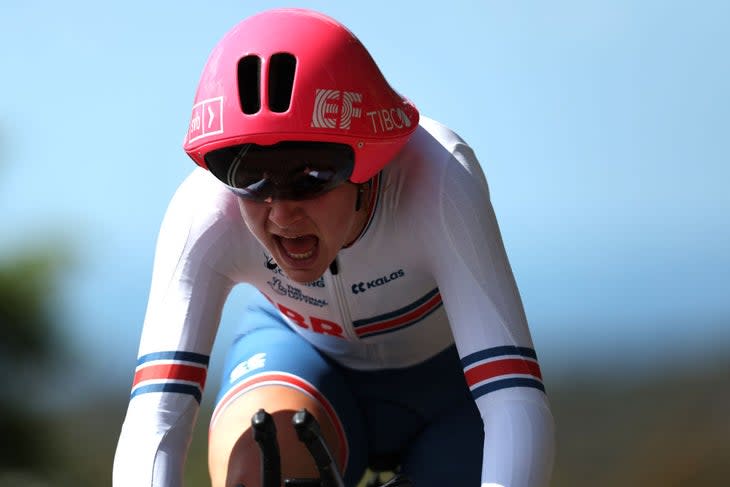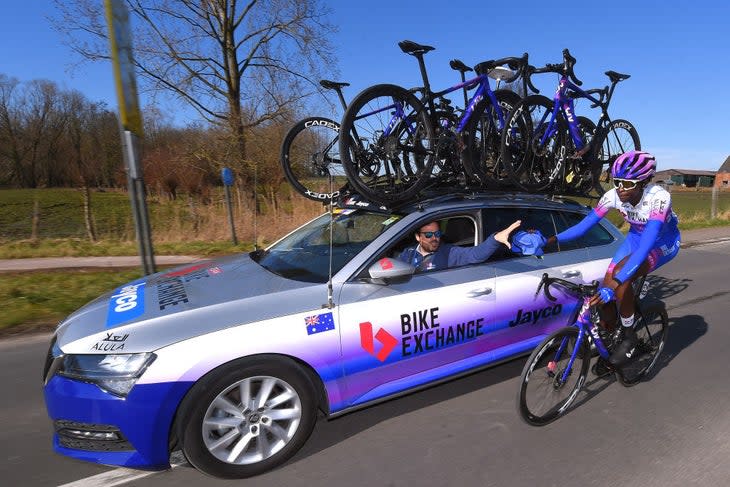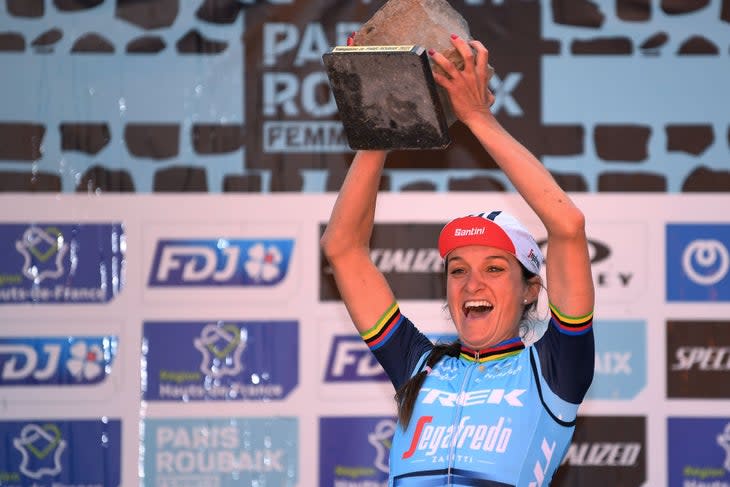Bigger salaries, maternity cover, development teams all part of big changes for women’s cycling in 2023
This article originally appeared on Velo News
Higher minimum wages, maternity cover, neo-pros, and development teams are among a raft of changes for the women's peloton heading into 2023.
Cycling's governing body, the UCI, has published a series of updated rules following several management committee meetings at the UCI Road World Championships last month. Most changes will come into effect on November 1, giving teams some time to adapt.
Changes for further in the future have also been detailed with an official U23 category officially being added for 2025. Meanwhile, the distance of women's road races at the Olympics or world championships will increase by 20km.
Also read:
UCI promises equal minimum wages for men and women pros 'as quickly as possible'
Team BikeExchange to match minimum salary of women's team to that of men's
Fight for final Women's WorldTeam license heats up as opportunities for points dwindle
Minimum salaries for the Women's WorldTour were implemented back in 2020 and have been gradually increased since then. Having initially been set at just EUR15,000 for the first season, they were raised to EUR27,500 for this year.
Next year will see the minimum salary raised to EUR32,102, in line with the minimum set for men's ProTeams for the same period.
Last year, the UCI stated its intent in getting the minimum for riders in top women's teams to match their male counterparts "as soon as possible." There is still some way to go for the women to match the current minimum of over EUR40,000 but the next two years will see some big rises with EUR35,000 the minimum for 2024, rising to EUR38,000 for 2025.
As of now, there is no indication of a minimum salary for Women's Continental teams, though some national federations have started implementing their own.

In addition to the new rises, a "new professional" salary has been added for the first time following the inclusion of a neo-pro category for women's teams.
Until now, all new riders on Women's WorldTour had to be signed up on a full-professional contract, no matter how old they were. This was a big deviation away from the rules on the men's side, which have long allowed neo-pro contracts for young riders.
As with the men's side, riders registered as neo-pros will be paid less than their older counterparts. For 2023, the new minimum salary will be EUR26,849 and that will rise to EUR31,768 for the 2025 season.
To be classified as a neo-pro, the rider must be 23 or under in the year that their contract starts. If the neo-pro contract starts prior to June 1 of any given year, the status will remain until December 31 of the subsequent season.
So, any new pros snapped up at the beginning of 2023 will have neo-pro status through 2024. Any who get signed up on a full contract after June 30 of next year will retain that neo-pro status through 2025.
Bigger teams, more cars

The introduction of the neo-pro status has implications for the number of riders a WorldTeam can sign up. At the moment, the maximum number of riders in a top-tier team is limited to 20. However, that goes up to 21 if a team has a single neo-pro rider.
If a team has two or more, it can sign up to 22 riders for 2023. The maximum number of 20 was introduced for 2021, though most teams had just 14 or 15 due to financial constraints.
Team sizes during races will also go up for the longer top-tier stage races. For WorldTour races of six stages and above, teams will be expected to field a roster of seven riders. For those five stages and lower, it remains either six or seven -- depending on the organizer -- while UCI ProSeries races will be the same. One-day races will be restricted to a starting line-up of six.
Another major in-race change will be the number of vehicles a team can have in a race. Until now, women's teams have only been able to have one car within the race convoy.
This was highlighted in an incident during this year's Tour de France Femmes when Human Powered Health's Barbara Malcotti was disqualified for receiving assistance from the wrong place in the bunch. She pulled out of the bunch from near the front after her team car pulled into the side of the road after it had been servicing the breakaway.
From next year, teams will be allowed two vehicles to be on the race convoy but only on WorldTour stage races that have at least six stages. This includes events such as the Tour, the Giro d'Italia Donne, and many other major events.
Development teams and a U23 category
ThomasMaheux_TrainingCamp_CSG_Team_132027-1300x812-1.jpg?width=730)
The new rules will allow for Women's WorldTeams to officially register a development team from 2023. At this time, Canyon-SRAM is the only top-tier women's team with a related Continental squad.
Under the updated regulations, the two teams must be operated under the same paying agent and the kit and names must "share a common identity." The team will need to fulfil the UCI's requirements for Continental teams.
By making development teams official, the WorldTeams will now be allowed to bring riders up from the younger squad for guest appearances at races. The riders will still be considered members of the development team and any points earned will go to that squad rather than the WorldTour counterpart.
The introduction of neo-pro status and rules for development teams is all part of a move that looks to provide space for younger riders. This year saw the first-ever U23 women's world champions crowned with Vittoria Guazzini and Niamh Fisher-Black taking the time trial and road races respectively.
Controversially, the competitions were run within the elite women's events in Australia. That will change in 2025 with the UCI officially introducing a U23 category for that year with the road race set to be contested over a distance between 110km and 140km. Meanwhile, the TT will be between 20 and 30km.
All of the minimum and maximum course distances have been updated for the Olympic Games and world championships for 2025, except for the elite men. The elite women's road race will be upped by 20km, while the maximum distance for the junior women has also been increased by that margin, pushing up the potential maximum distance to 100km.
While women will have to wait for a full U23 category, the UCI has introduced a new points system for the worlds. This year, U23 riders earned points based on their position within the elite race, but next year will see them get their own points scale.
If the scale was in place for this season, Fisher-Black would have earned 200 UCI points instead of the 70 she earned for her road race title. On the other hand, Guazzini would have been given 125 instead of the 150 she got for finishing fourth in the elite category.
Maternity cover

Maternity leave was one of the major changes when the Women's WorldTeam contracts were originally devised. Prior to that, teams had no obligations to provide any sort of maternity support for riders who became pregnant.
Several riders, including Lizzie Deignan and Elinor Barker, have taken time out of racing to give birth with others indicating that they hope to do it in the future.
However, until now, there has been no equivalent of maternity cover available for those riders and teams have had to operate one rider short for the period of the leave.
New changes for the 2023 season will allow for it at any time during the season. Under the UCI regulations, Women's WorldTour teams can only register riders between June 1 to July 15 for changes during a season and July 1 to November 1 for transfers between two seasons.
There are restrictions to this new rule and riders who are already contracted with another Women's WorldTeam or Continental team cannot be registered outside of the usual registration periods.
For exclusive access to all of our fitness, gear, adventure, and travel stories, plus discounts on trips, events, and gear, sign up for Outside+ today.

